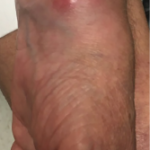An 83-year-old established female patient who resides in a skilled nursing facility (SNF) and is diagnosed with rheumatoid arthritis with rheumatoid factor in multiple joints returns to the office for her first infliximab infusion. She denies fevers, cough, dyspnea or concurrent illness, but has joint pain and swelling in both elbows and her left wrist. She rates the pain level at 7 on a scale of 10, and the pain is usually worse in the morning. No changes were made to the patient’s medications, which include weekly methotrexate subcutaneous injections, folic acid and ranitidine. She was married for 51 years and has been a widow for the past 10 years. Her husband was a smoker for all of his adult life and died from lung cancer. She was a school teacher.
Her weight is 135 lbs., height 5’3”, and she has a temperature of 98.4°. Her lungs are clear to auscultation with no cough. Her mood is good with no acute distress. Both elbows are positive for swelling with decreased ROM, and her left wrist has mild swelling. There are zero tender joints.
The patient’s TB labs are reviewed, and the results are negative. She receives a refill on her current medication and is sent to the nurse to begin the infusion.
Her IV port is started at 10 a.m. and the IV infliximab 200 mg infusion is started at 10:15 a.m. and is completed at 12:27 p.m.
It is not known until after the infusion is completed that the patient currently resides in a skilled nursing facility.
How would you code this patient encounter? Click for the answer.
